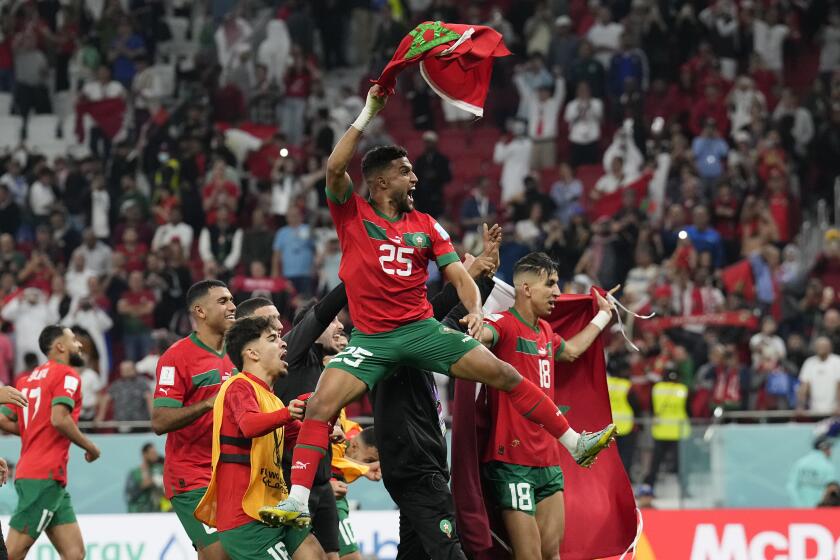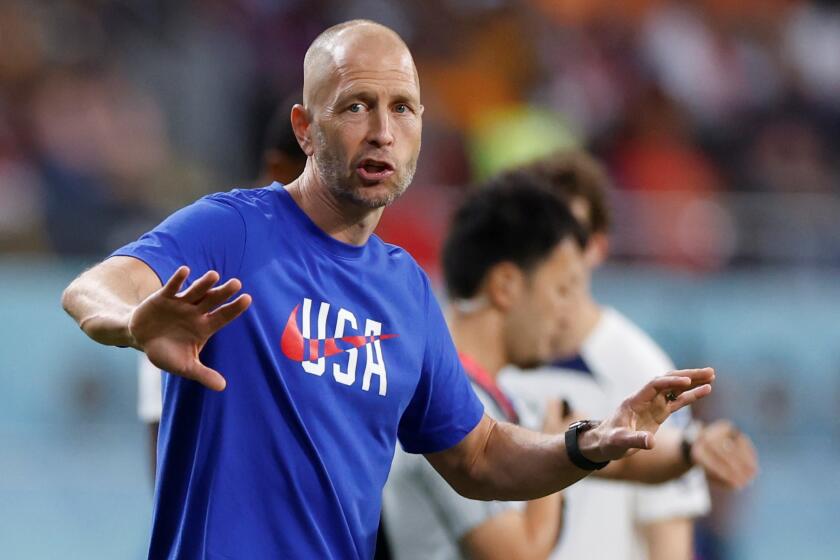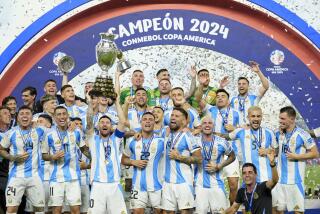Lionel Messi’s magic run for first World Cup title continues as Argentina makes final
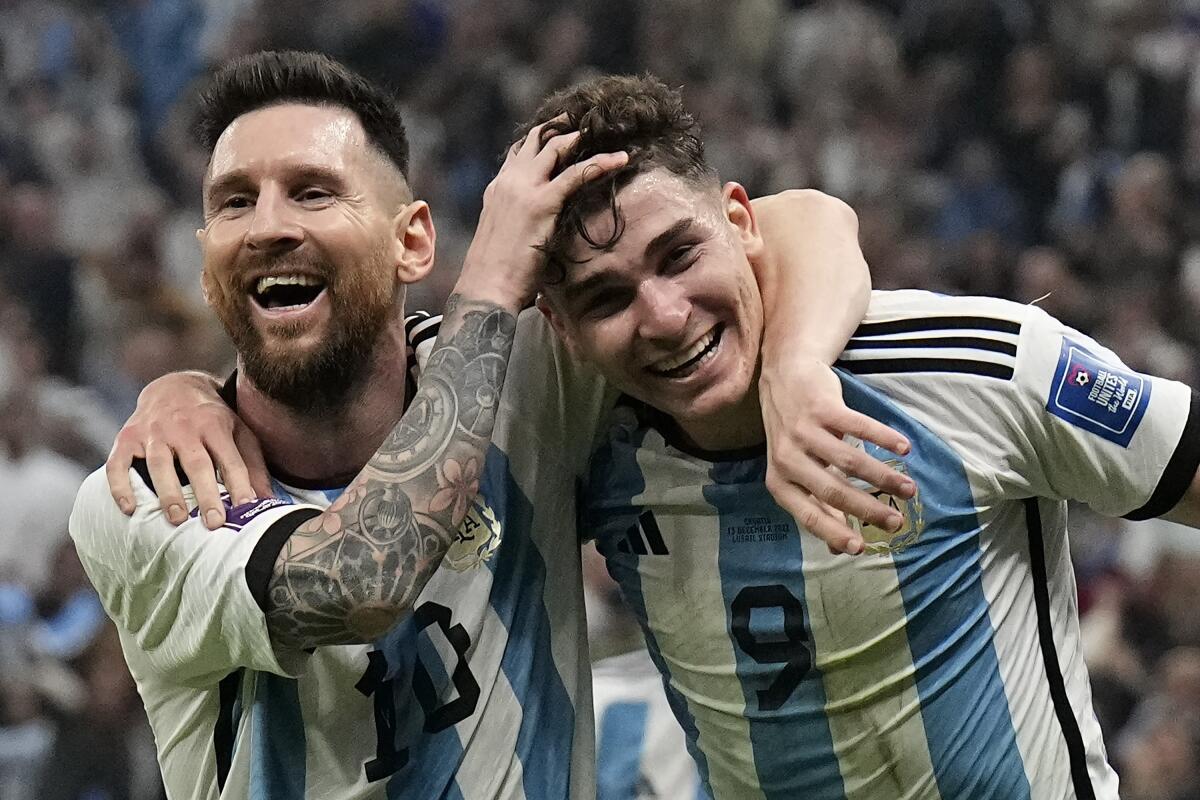
- Share via
LUSAIL, Qatar — It seemed fitting that when the final whistle blew on Tuesday’s World Cup semifinal, mercifully ending Argentina’s 3-0 dismantling of Croatia, Lionel Messi stood alone in the center of the field, drinking in the celebration.
Messi has stood apart from the crowd throughout this tournament, the last World Cup of his storied career. He’s scored five goals, three of which put his team ahead to stay. Only France’s Kylian Mbappe has as many.
He’s assisted on three others; no one has more.
Eight of Argentina’s12 goals, which are second most at the tournament, have come from or through Messi, who has willed his team into a second World Cup final in eight years, moving him within a win of lifting the one trophy that has eluded him.
One game, against the winner of Wednesday’s France-Morocco semifinal, will determine whether Messi is the best of all time, or simply a great player who never won on the sport’s biggest stage. The pressure should be suffocating; it has crushed Messi before.
Only this time he’s embracing it, standing apart from the crowd and drinking it in.
Geographically, Morocco is a North African country. Culturally and linguistically, it is part of the Arab world. Its World Cup success is an inspiration in both places.
“What I can say is that I am enjoying this a lot,” he said after Tuesday’s win, the hint of a smile where a grimace usually is. “I am feeling really good. I feel strong enough to face every match.
“Personally, I feel very happy.”
It hasn’t always been this way. In 2014, his only other World Cup final, Messi vomited on the field late in a 1-0 loss to Germany. He was named the tournament’s best player, but Germany was the best team.
Two years later, after missing a penalty kick in Argentina’s loss to Chile in the Copa América Centenario final, a frustrated Messi, speaking through tears, said he was retiring from international soccer. He was the tournament’s second-leading scorer on a team that finished second.
That was two World Cups ago; Messi didn’t retire and the stress only has grown. But now, confident in the fact Sunday’s game will be his last on soccer’s biggest stage, Messi is welcoming the experience.
“I am enjoying it a lot,” he repeated.
The difference between then and now may be the supporting cast surrounding him. Argentina is ranked No. 3 in the world, its best showing in six years, and it came to Qatar riding a 36-game unbeaten streak, the second longest of all time.
Then it lost its opener to lowly Saudi Arabia. That loss, Messi said, changed Argentina’s tournament.
“The first match was a hard blow,” he said. “To start in such a way in a World Cup was a test for the whole team. But we proved how strong we are. Every match was a final. We were aware that if we didn’t win, things would be harder for us.
“We’ve played five finals. Internally we were confident that we would make it because we know how good our team is.”
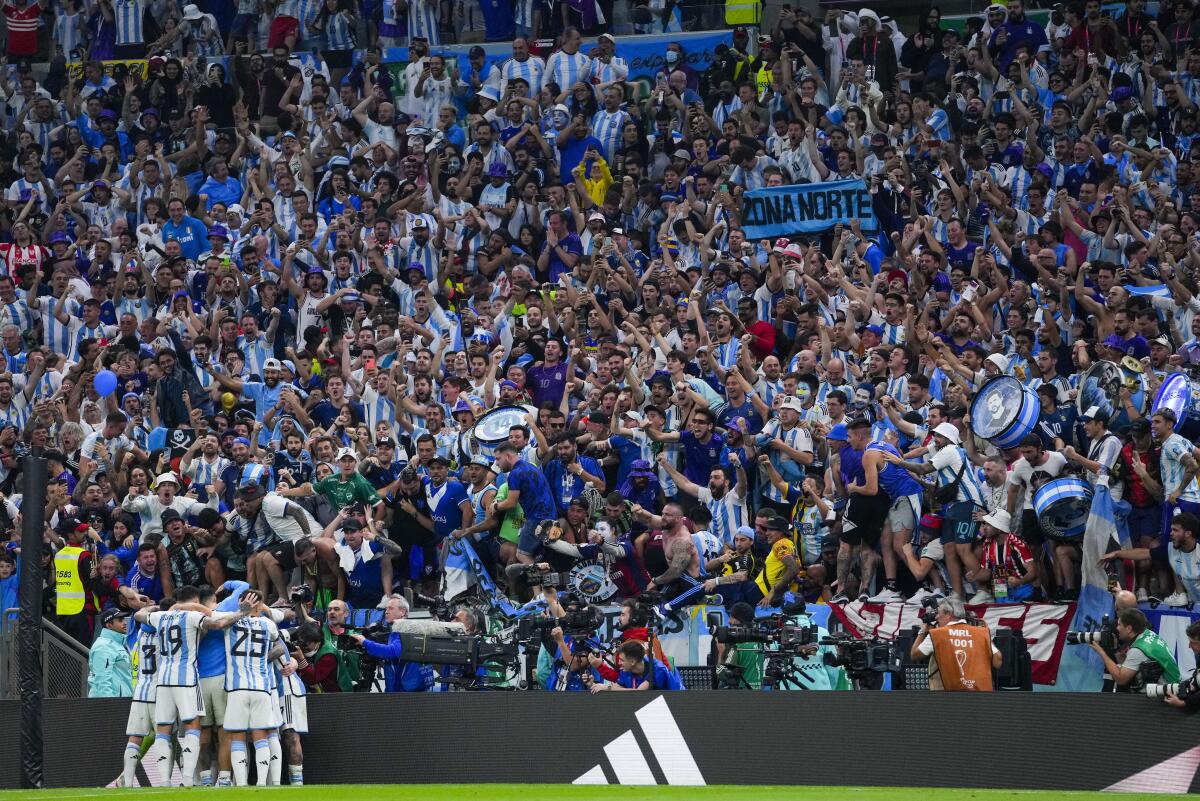
That team has grown as the tournament progressed, shutting out Mexico and Poland to win its group, beating the Netherlands on penalty kicks in the quarterfinals and then completely dominating a previously unbeaten Croatian team that made the final four years ago.
“This is a very intelligent squad,” Messi said. “We know how to suffer when it’s necessary, how to have the ball when it’s needed. We know what we have to do.
“We are not lost. We know what to do in every moment of the game.”
Messi and forward Julián Álvarez each had a hand in all three goals Tuesday, the first of which came on a Messi penalty kick in the 34th minute, set up when Álvarez went down in the box after a clumsy challenge from Croatia goalkeeper Dominik Livakovic.
Álvarez got the next goal mostly by himself. Released by Messi at the halfway line, Álvarez charged up the center of the field, weaving his way through the Croatia defense. In the box he steered around defender Josip Juranovic and away from Borna Sosa, got help from a fortunate deflection, then poked the ball in with his right front from close range to give Argentina a 2-0 lead at the break.
Messi and Álvarez hooked up again in the 69th minute, this time with Messi doing most of the work, hugging the touchline as he battled Josko Gvardiol up the right wing before turning into the penalty area and delivering a beautiful ball for Álvarez in the center of the box.
The easy finish gave Álvarez a brace and made Messi the first player since 1966 to have a goal and an assist in three games in the same World Cup, an achievement he celebrated with Argentina’s fans, darting to the edge of the stands behind the goal to revel in the applause.
“Nothing much needs to be said about Messi’s qualities,” Croatian coach Zlatko Dalic said. “He’s probably the best in the world. And he was again today. It was the true Messi that we expected to see.”
Argentina coach Lionel Scaloni, who was in tears after the win, just shrugged.
“There is nothing left to say about Messi. It is indeed a privilege to have Messi in the squad,” he said.
The strife that has ensnared Gio Reyna and the U.S. men’s soccer team isn’t solely Gregg Berhalter’s fault, but the coach is expendable — and Reyna isn’t.
He’ll be in the squad for at least one more game. Messi, 35, announced earlier this fall that this World Cup would be his last. Sunday’s game will be his 26th in World Cup play, most all time. His penalty-kick goal Tuesday was his 11th, breaking Gabriel Batistuta’s Argentine record.
There is only thing left for Messi to accomplish and that is to finally lift the Cup. Then he truly will stand alone.
“A lot is going through my head — it’s very emotional seeing all of this,” Messi said, looking up at a stadium packed with 88,966 mostly Argentine fans, matching the largest crowd for a World Cup match since the 1994 final at the Rose Bowl. “To see the fans — ‘the family’ — during the whole tournament was so incredible. We’re going to the final, which is what we wanted.”


